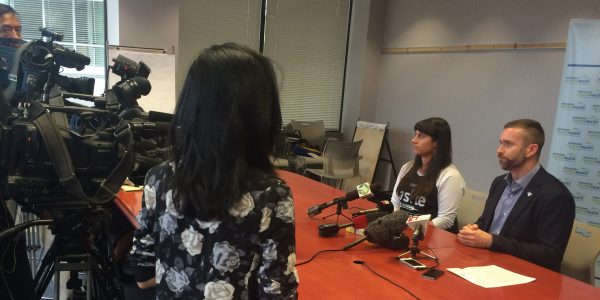A sober anniversary: one year of the overdose crisis
Friday, April 14, 2017 marks the one-year anniversary of the declaration of a public health emergency in response to opioid-related overdoses in B.C. It’s been an incredible amount of work for many people, and it doesn’t appear to be letting up anytime soon.
President and Chief Executive Officer of VCH, Mary Ackenhusen, says, “The dedication and capability of all staff, VCH, PHC, PHS, Atira, VANDU, BCEHS (BC Ambulance) has been amazing. All of you are living your values, and VCH/PHC’s values, by actioning the belief that every person counts – and every person deserves the best we can give them.”
“We should never have gotten to this point in the first place. We need to work with government to change the factors that leave people susceptible to addiction such as appropriate housing, welfare rates and conditions, opportunities to work and education. I hope we can stem the tide of death soon. Then we can put our full effort into taking action to better support the people who are susceptible to the chronic disease of addiction. Our role is not just to save lives. It is to change lives,” says Ackenhusen.
Timeline
- April 2016: Crisis declared.
- June 2016: OD tracking began in VCH rural hospitals (Bella Coola General, RW Large Memorial, Sechelt, & Powell River General Hospitals).
- July 2016: Fentanyl testing offered to clients at Insite.
- August 2016: START (Substance use Treatment and Response Team) opened, providing rapid access to at-home detox across Vancouver.
- September 2016: St. Paul’s Rapid Access Addictions Clinic (RAAC), an outpatient addiction clinic, opened.
- October 2016: Applications submitted to Health Canada for 2 new supervised injection services in Vancouver & request for proposals submitted for women’s only supervised injection service.
- November 2016: Spikes on Bikes & VANDU Overdose Prevention Outreach Team launched, to better respond on DTES streets and alleys.
- December 2016: 5 overdose prevention sites opened & Mobile Medical Unit (MMU) temporarily stationed in DTES. All 14 emergency departments & urgent care centres now trained & stocked to give take-home naloxone kits to overdose patients upon discharge.
- January 2016: Prime Minister Justin Trudeau visited DTES Connections & talked to local health care staff.
- March 2017: DTES Connections, on-demand treatment, opened.
Overdoses by the numbers
- In 2016, 914 overdose deaths due to illicit drug use in BC.
- Fentanyl was detected in 60%.
- In 2016, 253 deaths were in VCH: 215 in Vancouver, 11 in Richmond, and 27 on the North Shore Coast-Garibaldi
- VCH has 99 non-acute sites where take-home naloxone kits are available (in addition to ED’s).
More info
A special presentation on the overdose crisis was made April 12 at the Vancouver City Council by VCH’s Chief Medical Health Officer Dr Patricia Daly and Provincial Health Officer Dr Perry Kendall, in light of the anniversary.
To find out more about overdoses and VCH/PHC activities, visit VCH’s overdose prevention and response webpage.

